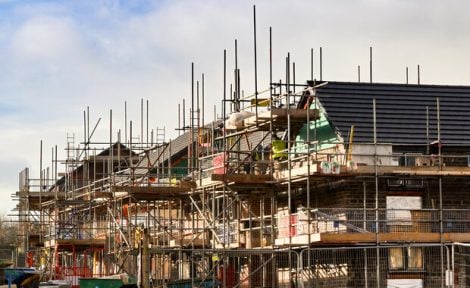Let’s get Britain building!
The Government must speed up the planning process and support small builders to boost housing numbers, says Stewart Baseley, Executive Chairman, Home Builders Federation.
 Housing is currently at the very top of the political agenda. All the main parties now acknowledge that we face an acute housing crisis and need to increase supply.
Housing is currently at the very top of the political agenda. All the main parties now acknowledge that we face an acute housing crisis and need to increase supply.
Over the past two years things have improved. All indicators are that there has been a steep increase in the number of homes being built. Output has risen from 110,000 homes a year to 130,000-140,000, the steepest increase for 40 years. But we are still a long way from delivering the 230,000 homes a year the country needs.
Issues and solutions
The short-term problem has been mortgage availability. Following the economic crash of 2007/08 people simply couldn’t afford the deposits required to secure a mortgage and if people can’t buy, builders can’t build.
The longer-term constraint has been the planning system. It has not delivered enough land for the number of homes the country has needed for decades.
We now have a Government clearly committed to increasing the number of homes built. We have pro-development policies introduced by the Coalition and new Conservative administrations – and indeed the Labour one before them.
The improving economy has seen mortgage availability increase; whilst the Help to Buy scheme that allows buyers to buy a new build with a 5 per cent deposit has dramatically increased demand for new homes. The extension of Help to Buy was a boost, giving the industry more confidence in future demand, and allowing companies to invest in the land and people needed to maintain increases in output. Increasing homeownership is a key Government target and a premise we clearly support.
New initiatives
The recent Housing Bill contained more details about its new Starter Homes scheme that it has committed will deliver 200,000 homes. There is still much detail to be agreed in terms of how the new scheme will work before we can assess its likely impact, but if it can help people that currently cannot access the market and lead to additional demand then it could play a big part.
The planning system too is now delivering more permissions. The National Planning Policy Framework, introduced in the early days of the Coalition Government, has bedded in and as a result we are seeing an increase in the number of permissions granted.
Despite the improvements however it still takes far too long to get from a planning application to securing permission, and then to the stage when building can actually commence. Ensuring we have the processes in place and that local authorities have the capacity to deal with applications in a timely manner so that we can speed up this ‘end to end process’ will be essential if we are to maintain increases. The Government does recognise this and we have seen a range of measures introduced in the Productivity Plan and Housing Bill that should help.
If the Government can work with us to create the economic and policy environment that allows us to deliver, building numbers will rise.
Government must also continue its drive to introduce policies that allow smaller builders to deliver. The contribution to housing numbers made by SME builders has reduced by 80 per cent since the start of the 1990s and if we are to meet targets, they must be allowed to play their part.
There is also a huge challenge with regards to skills. Over the past two years the industry has been recruiting heavily and taking on many more apprentices and graduates. It is targeting school leavers, looking to attract the brightest and best young people to the broad range of technical, professional, site and office based opportunities available – as well as looking at what training is required to bring experienced workers and ex-military people into the industry. If we are to maintain increases in supply, it is imperative we continue to attract, recruit and train more people.
The future
If we can continue to increase output the country will reap significant benefits. As well as the obvious social advantages of ensuring we are providing enough of the high quality housing the country needs, there are huge economic benefits too of accelerating house-building activity. Delivering the additional 100,000 homes we need would create another 430,000 jobs, generate a further £11.9 billion in economic output, and provide £2.7 billion for additional community benefits, including affordable homes, education, health and open spaces.
In short, if the Government can continue to work with the industry to create the economic and policy environment that allows us to deliver, numbers will continue to rise. And whilst doing so is a complex and difficult process, it is a challenge that both Government and the industry are committed to addressing.






